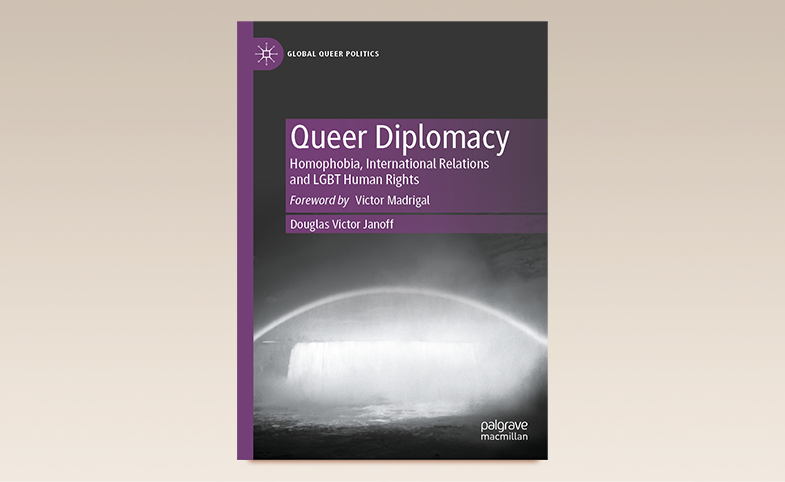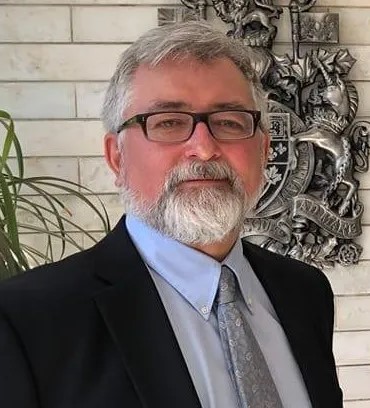
Meet the Author: Douglas Janoff

Douglas Janoff was appointed to Canada’s Foreign Service in 2009. A seasoned human rights negotiator, his career has included diplomatic postings to Washington, D.C., Afghanistan and Pakistan.
His recent book, Queer Diplomacy: Homophobia, International Relations and LGBT Human Rights, is the first study of multilateral LGBT human rights diplomacy, drawing from the perspective of diplomats, LGBT activists, human rights experts, multilateral specialists, and other practitioners.
What are some of the main challenges facing diplomats who seek to advance LGBT rights in the international arena?
One obvious challenge is that LGBT rights are not listed in the Universal Declaration of Human Rights, so many governments do not see them as a “legitimate” human right. To paraphrase George Orwell, some rights are considered more “equal” than others. This leads to other challenges: diplomats who promote LGBT rights both bilaterally and multilaterally are confronted by poisonous, dehumanizing discourse. By framing LGBT individuals as predators, heretics or sick people, opposing diplomats transmit a stark message on the world stage: we are undeserving of equal rights, dignity and respect. While working abroad, some diplomats struggle to assist LGBT community members who have been targeted by state- and non-state actors. Then there is the unique situation of LGBT diplomats: they may not feel safe to come out, and they often do not enjoy the same benefits and privileges as their straight colleagues. If LGBT diplomats come from societies that do not accept – or actively oppose – LGBT rights, they may even find themselves in situations where they are forced to oppose the basic human rights of their own community members.
How did you first get the idea to write this book?
As a Canadian Foreign Service Officer, I spent quite a few years in the area of human rights diplomacy. As my career progressed, I was surprised by the prevalence of homophobic and transphobic rhetoric that permeated international human rights forums. I learned how diplomats, mostly from Western and Latin American countries, promoted LGBT rights in partnership with civil society organizations. I also observed how opposing countries – mainly from Asia, Africa and Eastern Europe – developed counter-narratives that minimized LGBT rights and denigrated LGBT people. I decided to return to school to understand this phenomenon – how diplomats combat homophobia and transphobia on the world stage, and how their efforts are constrained by diplomats whose governments oppose LGBT rights. During the day, I was a diplomatic practitioner: on the weekends, and during the evenings and holidays, I spent thirteen years working on an interdisciplinary Ph.D. that allowed me to study this topic from many angles, drawing on scholarship in international relations, sociology, cultural studies, feminist methodology, and international law. I travelled to Geneva and New York, attended UN meetings, and interviewed dozens of people working in this area: diplomats, human rights experts and LGBT activists. The research formed the basis of this book.
Can you identify a notable recent success story in LGBT human rights diplomacy?
You will see that the Foreword to my book was written by Victor Madrigal-Borloz, the UN Independent Expert on Sexual Orientation and Gender Identity. His calm, diplomatic and inclusive approach to network building has created strong links between governments, human rights groups and LGBT advocates around the world. Since 2017, Victor, and his predecessor Vitit Muntarbhorn, have conducted fact-finding missions to: Argentina, Georgia, Mozambique, Ukraine, Sri Lanka, Tunisia, the USA, Cambodia and the UK. His reports are must-reads, demonstrating the cross-cutting nature of these issues, on subjects as diverse as: data collection, conversion therapy, “gender theory,” and forced displacement. This is a watershed moment: solid, well-documented evidence of widespread, systematic discrimination and abuse on the basis of sexual orientation and gender identity is now being disseminated both inside and outside the UN system. However, getting to this point was not easy. The creation of the Independent Expert’s position was in itself a diplomatic breakthrough: the mandate was fiercely debated when first presented to the UN Human Rights Council in 2016. Although several UN member states have expended considerable resources to oppose the work of the Independent Expert, this backlash has generated a lot of support for LGBT rights from other member states.
What aspect of your research did you most enjoy?
Conducting my research was a self-actualizing experience, allowing me to integrate three important aspects of my identity: Doug the diplomat, Doug the social analyst, and Doug the queer advocate. I have worn these hats at different times in my life. It’s thrilling to publish a book that synthesizes the knowledge I have gained over the years. For example, on the first page of my book, I describe how I and a group of other young protesters marched through Manhattan to the UN Headquarters in 1984 in support of global LGBT rights. Thirty years later, I describe a very different experience at the UN Headquarters. Now I was the diplomat, suited up and interviewing young queer activists who were now shaking things up on the “inside,” negotiating UN resolutions and demanding justice. I have witnessed – and been part of – a social movement that has made spectacular gains over the course of my lifetime. However, as a white cisgender North American male, I understand how privileged I was to inhabit this vantage point. Interviewing LGBT diplomats – who opened their hearts and described their challenges and frustrations – was a validating experience. Interviewing straight diplomats who promoted LGBT rights was equally illuminating: many were deeply affected by the ways that LGBT people are stigmatized and dehumanized in international forums. I’ve written this with the sincere hope that a younger generation of diplomats, activists, and human rights experts can understand where this movement has come from and where it is heading.
Why is Queer Diplomacy an important book for students of public diplomacy?
Students of public diplomacy are at the forefront of the new culture wars and have powerful tools at their disposal. Social media platforms can shed light on the global efforts to combat state-sponsored homophobic and transphobic campaigns. Although these tools can be used by opponents of LGBT rights to stigmatize, target and persecute sexual minorities, students of public diplomacy can use these same tools to be one step ahead: countering false narratives, deflecting misinformation, forging like-minded networks, sharing knowledge, and amplifying proactive policy solutions. By reading the book, students of public diplomacy will come to understand that human rights violations on the basis of sexual orientation and gender identity are not simply a series of isolated incidents in faraway lands – this is an ongoing issue happening right here, right now – and it’s not going away.
Visit CPD's Online Library
Explore CPD's vast online database featuring the latest books, articles, speeches and information on international organizations dedicated to public diplomacy.
Popular Blogs
-
January 29
-
January 20
-
December 17
-
January 28
-
January 2







